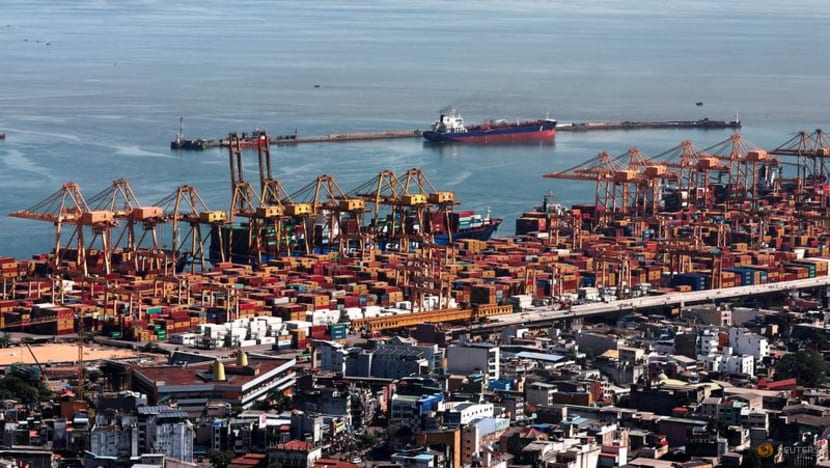'We will not be an ally of any group’: Sri Lanka will not pander to major powers, says foreign minister
Sri Lanka also has to invest money into areas that can sustain the economy such as renewable energy and making the country a maritime and air traffic hub, Mr Ali Sabry said.

A general view of the Colombo main port, Sri Lanka, May 13, 2024. (File photo: REUTERS/Dinuka Liyanawatte)

This audio is generated by an AI tool.
SINGAPORE: With inflation continuing to plague Sri Lanka as it recovers from its worst economic crisis in decades, the strategy is to increase salaries nationwide, the country’s Foreign Minister Ali Sabry said on Monday (Jul 8).
The prices that escalated during the height of inflation in 2020 have yet to come down, but incomes have not risen proportionately, he noted.
The cost of living remains elevated, with prices of basic food products such as rice, eggs and sugar at twice their levels compared with before the economic crisis.
“Our challenge is: Rather than trying to bring the prices down, increase the income and the salaries of our people as we go forward,” he told CNA’s Asia First in studio in Singapore.
He added that the country aims to do this within six to 18 months. To begin, the country needs economic growth, and for that, it is seeking foreign investment, he said.
Sri Lanka is expected to go to the polls later this year.
SRI LANKA’S ECONOMIC RECOVERY
While prices remain inflated, they are a far cry from the peak of 70 per cent. Inflation has currently settled at about 1.7 per cent.
Sri Lanka’s gross domestic product (GDP) grew over the last three quarters, after contracting by double digits at the height of the crisis.
Mr Sabry pointed out that Sri Lanka has done “remarkably well”, going from a double-digit recession to a 5.3 per cent increment.
“Tourists are coming back. The Sri Lankan rupee has strengthened about 20 per cent … And also our reserves have come up. And for the first time after six years, we have a primary account balance. So all the indicators are in the right place,” he said during the wide-ranging interview.
However, World Bank estimates show that poverty has doubled since 2021, with a quarter of the population living below the poverty line.
Acknowledging that this vulnerable segment of the population is further affected by the inflation, Mr Sabry said the government has tripled the direct cash transfers provided to those who live below the poverty line - about 2 million families.
“(The) idea is right now to protect the most vulnerable, spur growth and have it sustainable over a period of time so that the economy will be back on track, ever to fall into a situation like we faced two years ago,” he said.
Sustainable growth without hurting the poor disproportionately requires the country to fight corruption, improve the efficiency in services and bridge the digital divide, he said.
Sri Lanka also has to invest money into areas that can sustain the economy such as renewable energy, bond development and making the country a maritime and air traffic hub, Mr Sabry added.
BALANCING RELATIONS
The way to become a hub is to keep orders open, he said, adding that Sri Lanka would welcome any investment from any country as a strategy partner. He however noted that it is of utmost importance that the country does not fall into any trap.
“No longer would we be getting debt and supporting investment. We would like to have partnership, JVs (joint ventures) and investment so that we will continue to have our debt sustainability,” he said.
Among the factors that led to Sri Lanka’s crisis was the country’s difficulties in managing its external debt, which had grown in part due to loans from China - to fund ambitious infrastructure projects.
Sri Lanka needs both the east and the west and has good relations with countries on both sides, he said.
On the geopolitical front, even as China, India and the United States vie for power in the Indo Pacific, making Sri Lanka a potential battleground, the country will not take sides, said Mr Sabry.
“We will not be an ally of any group, whether western or eastern. We will continue to be an independent country,” he said.
“We will take decisions which would suit Sri Lanka and which suits the region, which will de-escalate the tension,” he added.
He said that as a country that aspires to be a regional hub on maritime security, it has an obligation, under the UN Convention on the Law of the Sea, to support the freedom of navigation.
“So freedom of navigation for all countries, not for certain countries,” he said.
His comments came amid reports that Sri Lanka will in January lift a one-year port ban on foreign research ships.
The moratorium was put in place following security concerns raised by India and the US over frequent docking requests from Chinese vessels conducting research in the Indian Ocean. These high-tech vessels are feared to be involved in spying activities.
However, on Monday, Mr Sabry said the lifting of the ban is not cast in stone. It depends on the circumstances, and will be reassessed towards the end of this year, he said.















